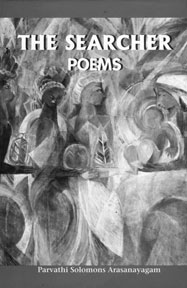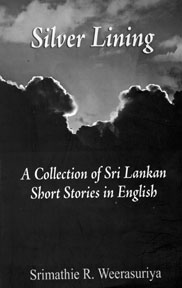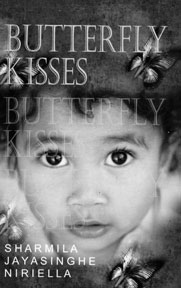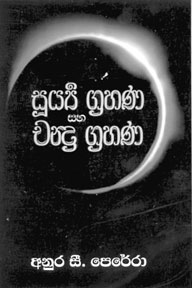|
The Searcher, poems :
Poetic saga of survival and reminiscences
*********
The poet revisits the mileposts of memoirs of her idyllic days
spent at the University of Peradeniya and turbulent period in which she
had to part with her university colleagues for good and the life of
solitude thereafter. By and large the anthology reflects on the life and
times of the poet against the backdrop of changing socio-economic
realities of the nation. It is these realities and the places, people
that make the flesh and blood of the poems which in a way is a
collective memory of the nation albeit from an individual perspective.
One of the prominent characteristics of the poet is the economy of
expression and ability to relate life experiences to politico-cultural
events of the milieu. At one level, the poems are individual experiences
related from a highly individualistic perspective and at another level;
they are the agonies and experiences of the masses. The characters that
peopled the anthology are those who were known to the poet and at the
same time, they are ambassadors of diverse social strata with their own
world views and of different ideologies.
In most of the instances, it seems that the narrative poem is the
poet's preferred mode of expression. Almost all the poems are either
narration of personal saga of her survival or of people and incidents
that made milepost in her personal history. However, most of the
creations stand out for their organisation, use of appropriate
metaphors, similes and brevity of expression. The poet has devised a
beautiful yet insightful diction together with an equally attractive
style which is appropriate for each poem. Her ideas seem to emerge
effortlessly, unpretentiously from the bottom of her heart.
This is undoubtedly a piece of literature which can represent Sri
Lanka beyond our shores.
**********
Reviewed by Ranga Chandrarathne
 "The
Searcher poems" is the latest anthology of poems by Parvathi Solomons
Arsanayagam. The anthology is divided into five sections each making a
defining phase in the life of the poet. "The
Searcher poems" is the latest anthology of poems by Parvathi Solomons
Arsanayagam. The anthology is divided into five sections each making a
defining phase in the life of the poet.
The poems under the sections of Lonely Peacock's Cry, Elephants,
Yesterday's Postscript, and Paradise Lost, The Searcher and Soliloquies,
deal with a wide range of topics ranging from socio-political issues to
issues of identity and feminism. In the section "The Lonely Peacock's
Cry", the poet sets the theme:
"I felt the sense of timelessness
In the exploration of my saga of survival
That night I heard the lonely
Peacock's cry, in the distance terrain
Piercing, penetrating my dreams,
This is a transitory mirage
an illusion of an oasis
for me the bare image of desolate climes,
empty stretches of paddy fields
in which they search for vestiges of grain"
It is this illusory "Peacock's Cry" which haunts throughout the
anthology. The poet embarks on a journey in search of that "vestiges of
grain" which is the saga of survival through a turbulent cultural
landscape. Throughout the anthology, each poem relates to life-story of
the poet and profound isolation that poet experiences. For instance, the
poem
"The Monument" describes in most evocative manner the aftermath of
violent youth uprising.
"The bus drifts through waves
Of afternoon light, as I return
After teaching the "other tongue to the
New students who have arrived
to resume their lives after the revolution"
..a cemented wall,
Memories of those departed
And I think of those invisible
Monuments inscribed in mind,
Remembrances for those who departed
Departed from those battle zones
Created by nameless assailants"
So soon forgotten those
Macabre enactments
Of a somber past..."
After the fresh term commenced students have "resumed their lives"
six years after the "revolution", there is a concrete wall erected as a
monument. The poet points out that what is most effective, however, are
the "invisible monuments inscribed in minds".
Even those "invisible monuments in minds" would wither away with the
passage of time.
As elegantly expressed by the poet, soon everything will be
forgotten. "The Monument" is one of the evocative poems in the
anthology. Apart from conveying the profound shock at the unfolded
events and troubled time of the contemporary history of the nation, the
poet has dawn on the readers the universal message that however profound
and atrocious the calamity is, it will soon be forgotten and people
would resume their lives. The poet uses simple diction and metaphors
sparingly to arrive at the message and the poem concludes with a note of
philosophy.
In the poem "The Village", the poet describes the pathetic situation
in a village which has not seen the dawn of development and remains as
it had been centuries ago.
One of the effective and memorable poems in this section is
"Flowers-Harbingers of Time"; once again revisiting the civil war which
upturned the lives of generations, the poet walks alone a familiar road
that leads to the University of Peradeniya.
The flowers which evoke thousands of thoughts, have, here, been used
as the most effective metaphor. It is the flowers which bring back the
memories of the civil war which rocked the time.
"I feel my gaze seek flight with
The breeze that blow against this
Diverse landscape filled with subtle fragrance
Of violet convolvulus hedges
The stench of death then unknown
To my foolish perceptions".
I face the barriers and check a
points of this criss-crossed path
and encountered my own self-constructed
barriers, my own self imposed
silence as I witnessed the vicissitudes
of this civil war."
Here, the poet instead of mere narrating the events, analyses the way
in which each faces the civil war with their own self "made confines and
each has" spontaneous improvised scripts' of the unfolded events.
In the section "Yesterdays postscripts" the poet revisits the
landmarks which make her personal or living history. The elegantly
written poem "The past is scrutinised, the poet revisits the era of
brutality and violence which consumed the lives of a generation. The
poet recalls the memories of persons who survived in the "mindless
violence".
"fossil fragments discovered
Of the once living caught
Up in the mindless violence
Which is now history
Of those forgotten eras
In this rain ravaged terrain"
One of the prominent characteristic of Parvathi Arasanayagam is her
innate ability to create poetic situations out of seemingly
insignificant events and to relate them to a landmark in the history.
For instance the poem "The Past is Scrutinized" commences with "gleaming
eyes" of survivors and the scene shifts to people walking on a rain
filled road alone and the unearthing of fossilized remains of those once
living who had been caught up in the "mindless violence". In "A Sense of
Identity" the poet narrates her predicament of unable to find an
identity in the journey of the survival. It is obvious that the poet's
"Sense of Identity" has been shattered and there seems to be no port in
the horizon to be called at. The last poem of the anthology "Survival",
is also on the turbulent times in the aftermath of the youth uprising
and a vanished colleague.
"I wonder what happened to those
Sewing machines your colleagues
Were to purchase for the halls,
To sew new chintz dresses for
the students,
or else listening to your quiet
advice, "do not trust everyone"
observing certain students
whom you did not trust
vanished, all of them,
vanished that past"
Without doubt "The Searcher, poems" is one of the best anthologies of
poetry to emerge from the contemporary Sri Lankan literature in English.
The poems are marked for their language and metaphor which is in
Standard English. The poems are well grounded in the milieu and reflect
the defining moments in contemporary political history of Sri Lanka.
Among other things, the poet offers insights into the political issues
such as the youth uprising, issues of identity, feminism and her
personal odyssey of survival.
Display of brilliant narrative skills
*******
'Silver Lining'
A collection of Sri Lankan Short Stories in English
Author: Srimathie R. Weerasuriya
International Book House Publishers, Kurunegala
********
Reviewed by R.S.Karunaratne
 Many
authors write short stories. However, have you ever asked yourself why
you read them. The simplest and shortest answer we can give is that
short stories provide us with pleasures of engaging the way the short
story writer uses language to create a work of art. Many
authors write short stories. However, have you ever asked yourself why
you read them. The simplest and shortest answer we can give is that
short stories provide us with pleasures of engaging the way the short
story writer uses language to create a work of art.
On the other hand, by reading a short story we come to understand
different characters including the writer himself. Literature is a form
of invention and the short story writer is an inventor.
Unlike in the novel, a short story should contain only one connected
episode. When there are too many episodes in a short story it fails to
appeal to the reader. Although short stories fall into the category of
fiction - meaning not real life situations - The measure of their
success is how true are they to our emotions, how accurately they show
the life that is lived by all of us. Therefore, every minor details in a
short story adds to its strength.
More than a novel, we expect a short story to offer us a unity of
life by focusing on a single episode.
This brief introduction to short stories was necessary in view of the
book under review. Some of the stories found in the book are
outstanding. For instance, "The door and Mr. Silva" is one of the
successful short stories.
Here, the author has been able to maintain an uninterrupted suspense
from the beginning to the end. Even the ending is so unusual that the
reader will remember it."The awakening", another story found in this
anthology, has a closely-knit plot and a theme that runs through all the
events. It is a grim reminder to all young people that temporary
satisfaction of their sexual desires and love without commitment can
have serious consequences in their lives.
When an unmarried girl gets pregnant it is a serious problem for her
and her parents.
"Sirisoma and Rathu" is a fairly long story with a neat plot. It is
the story of a man who gets married to an elderly woman with six
children. the protagonist, an unhappy soul in his own family, falls for
a woman 16 years older than him. He helps her to bring up the six little
children.
However, after the death of his wife, the grown-up children turn
against him because he was not their natural father. This is a vert
common phenomenon in our society. Yet the writer has managed to keep the
reader in suspense through her brilliant narrative skills.
"Homecoming" treats another aspect of modern life. Today, children
have no time for their aged parents. Mrs. Perera, an aged mother,
decides to stay with one of her daughters. She is provided with all the
creature comforts but her daughter has other commitments and priorities.
Mother craves for her daughter's company more than anything else.
However, the daughter is more delighted to spend her time with her peers
than being with her mother.
In "The touch" a photographer falls in love with a woman whose
husband is missing in action.
But Nilupa, the woman, does not give her consent to him. The story is
beautifully crafted with restrained feelings on the part of the two
characters. This is another successful short story.
Some of the other stories have not been successful. For instance, in
"Youth" the author has tried to compare and contrast country life with
city life. It is more a feature article than a short story.
The last story "The viper" looks like a report of a series of events.
Even "The blouse" has an abrupt end. The reader might wonder what
happened to the blouse!Like most books published locally, "Silver
Lining" too has its own quota of typographical errors.
This could have been avoided.
Peep into complex human world
Reviewed by Padma Edirisinghe
 |
|
Book: Butterfly kisses
Author: Sharmila Jaaysinghe Niriella
Published by Sooriya publishers |
Armies, battalions, regiments - they power their way through. So do
some books - that is along the mind. Of course, for a book to bulldoze
through a mind it has to be very powerful..
One can begin to read a book with a prejudiced mind. Neither the
cover design nor the title of the book under review appealed to me
though the kid's face on the cover was very charming. No, it is not the
reborn kid's or murdered kid's face. You are in for many more muddles.
More prejudices. The author was almost unknown. Not even seen her byline
in the newspapers. But strangely the book began an immensely
power-ridden voyage across my mind even going on to make cracks on some
beliefs hitherto held.
Over the course of years (countless years?) I had settled for the
belief that Life ceases after Death never to be resurrected. Heretical,
for a Buddhist, some would say but I just had no 100% belief in it. And
here was an author, whom I personally learnt was not of my faith
narrating a tale of re-incarnation in a most convincing way. It is a
muddled motley of humans no doubt!
Shania, she is, the little heroine of the book, a 4-year old wisp of
a girl. From Down-Under where the author herself is domiciled. Murdered
by her own Daddy. Strangely Daddy's Girl she was known. Death reported
as by drowning after which her Life or mysterious elements of the
phenomenon called Life float across the oceans to a rural village miles
away from Colombo.
One wonder of this book is that it is the re-incarnation tale that
predominates while the Murder tale is underplayed and limited to a span
of about 30 words that occur right at the beginning and right at the
end, and that too in a an obscure way. That can be described as a
master- stroke by a novelist just entering the field and foretells very
bright vistas for the future. That affliction, verbal diarrhoea that
amateur writers suffer from is totally absent here and no wonder, the
blurb informs that the author is a long standing newspaper woman in
Sydney.Never have I read a book twice for a review but this I did just
to locate any sign of murderous tendency in Daddy but could not. He
loved his autistic daughter deeply. Then what made him do it? Only cue I
found was where he expresses his agony that once he and Christie, his
wife are no more that the child would be utterly helpless.
Some years back I was handed "Fourteen cases of Re-incarnation" by
Ian Stevenson for translation into Sinhala, which translation I never
did for some now forgotten reason. But I read the entrancing book and
came to these conclusions despite my shaken belief in the theory itself.
1. That most of those children endowed with Jathismarana wisdom (the
wisdom of peering into past lives) have been subject to sudden deaths
such as accidents or murders 2.
That they begin prattling about these past lives at the age of 3 or 4
as soon as they pick up the first words they hear 3. That the memories
come back in a painful way as bouts of hysteria, in many cases 4. If it
is murder that a family member is usually the culprit.
In such cases either the murderer goes free since no body suspects
him or her or even if found out the matter is hushed up to evade
scandal. It is obvious that the author has made use of the novel to
compare and contrast the busy sophisticated life of urban Australia and
the sylvan, sublime, relaxed atmosphere of a typical Buddhist village in
rural Lanka. The white sands of temple compounds glistening in the
silvery sheen of moon-lit nights, the no-leaves raining down with gusts
of winds, the white clad devotees on Poya nights, the clay lamps lit in
hundreds to honour the Blessed One, the saffron robed monks chanting
Suttas of a 2500 year old vintage in a deep sonorous tone...these images
are whipped up into a totality in the narrative when Christie (mother of
dead Shania) comes over to Sri Lanka in search of her daughter now in
new surroundings.
Her husband refuses to accompany her and you already know why. Dead,
they say carry no tales. But the Dead reborn with Jathismarana wisdom
can be very dangerous though no Courts take on their evidence.
All in all, it is a book that gives a peep into the complex nature of
the immense human world and its knots and issues that lie unsolved
despite all the scientific advances. It carries a tale well told via a
rich vocabulary (proof reading wanting), tale of suspense yet pregnant
with spiritual significance.
Good luck to the blossoming writer.
Book on 'Solar Eclipses' launched
 Anura
C. Perera, the well known science writer, who has won state recognition
has created another world record with his latest book on eclipses titled
'Soorya Grahana saha Chandra Grahana'. This book was launched at the
Kokeliya Army Training School grounds in Vauniya with the participation
of a large number of academics and army officers when the eclipse was
taking place. Anura
C. Perera, the well known science writer, who has won state recognition
has created another world record with his latest book on eclipses titled
'Soorya Grahana saha Chandra Grahana'. This book was launched at the
Kokeliya Army Training School grounds in Vauniya with the participation
of a large number of academics and army officers when the eclipse was
taking place.
Nowhere else in the world, has a book on solar eclipse been launched
while an eclipse is taking place. The first copy of Anura C. Perera's
book was handed over to Mrs. Rani Kumarasinghe, Regional Assistant
Director of Education (Science) of Bandarawela, by Madusha N. Dedigamuwa,
an active member of the 'Astronomical Association of the Ananda
College', Colombo at 1.20 p.m. on January 15. A distinguished gathering
including Col. A. Marasinghe, Lt. Col. Sudarmasiri, Lt. Col. Prassana
Liyanage and many army officers were present at this book launching
ceremony.
However due to the sudden death of his beloved wife Anura C. Perera
could not participate at the observation camp and the activities
connected with the launching of his book. Although he made it possible
for the whole country to watch the eclipse he had to spend the time near
his wife's coffin on this day.
It appeared to be an irony of fate and showed that no one can go
against nature and the eclipse is also a part of nature.
The solar eclipse observation camp at the Kokeliya Army Training Camp
in Vauniya was successfully organised by Dayasiri Perera an Amateur
Astronomer from Bandarawela on the guidance of Anura C. Perera.
A large number of academics and army personnel participated at this
Solar Eclipse Observation Camp and the book launching ceremony.
'Soorya Grahana saha Chandra Grahana' is published by 'Sarasavi
Publishers', Nugegoda. |

